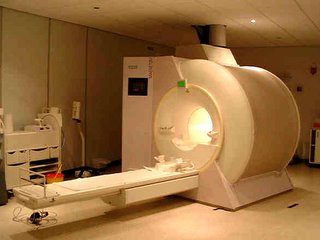
I watched the first episode of the new Canadian television series Terminal City last night. My wife wasn’t sure I should watch it, but I did. It is a ten-part series dealing with one family’s confrontation with cancer. In that episode, Katie Sampson discovers she has breast cancer. The next day she takes her daughter with her to the clinic where her biopsy is performed.
Ironically, my eldest son came with me today as I ventured to Grand River Hospital for my MRI, presumably a major piece of the puzzle considered by the tumour board which meets to review my treatment options this evening. The board will have in hand the CT scan, the images from the MRI, as well as the biopsy results from last week and all the other colonoscopy and sigmoidoscopy reports. But I won’t be there. In fact, it may be next week before I meet again with the surgical oncologist to hear what the board has determined is the best way to address my rectal cancer. While I wait, they deliberate.
The MRI itself was painless. There was an intravenous, as there was for the CT scan, and there were problems yet again finding a good vein in my arm, but the procedure was straight forward. The procedure was forty minutes of keeping very still and listening to what I call a “magnetic symphony”. Even with ear plugs and a face cloth across my forehead and eyes, the sensation of the magnetic resonances, each with a distinctive tonality and rhythm, was enough to keep me in a kind of limbo state, close to sleep, but still aware. I was a little concerned that I might move my body as the images in that near-sleep state kept floating through consciousness.
Again, like the CT scan, we stopped about half-way through the procedure for a contrast injection to illuminate the vascular system in the pelvic region. The only awkward thing from the patient perspective about the whole procedure was the length of time required. But from the little I have learned about the technology, the time required is well compensated. The MRI images can be highly tuned to answer precise questions that the medical team has regarding an injury or condition.
Now, I have a few questions that need to be answered too!

No comments:
Post a Comment